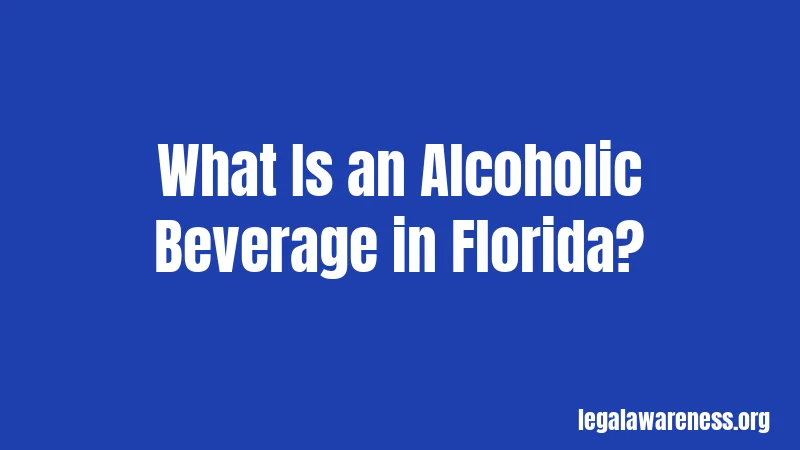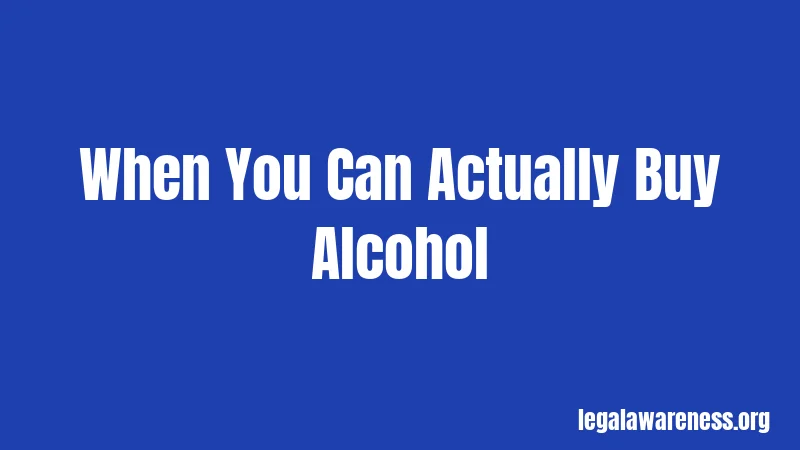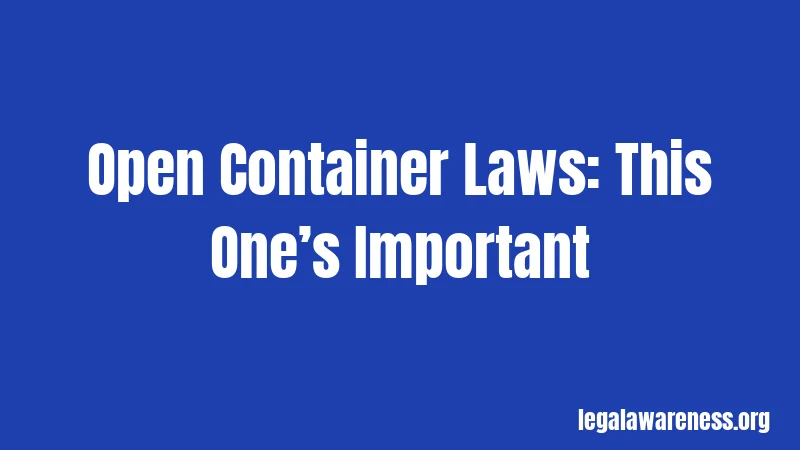Florida Alcohol Laws in 2026: Everything You Need to Know
Most people have no idea how strict Florida’s alcohol rules really are. Seriously. You could be breaking the law without even realizing it. The good news? Understanding these rules is pretty straightforward. Let’s break down what Florida allows and what it doesn’t.
Florida takes alcohol violations seriously. Fines can hit hard, penalties can escalate quickly, and some violations stay on your record. Whether you’re a resident or just visiting the Sunshine State, knowing these laws could save you from serious legal trouble.
What Is an Alcoholic Beverage in Florida?

Florida defines any drink with at least 0.5% alcohol by volume as an “alcoholic beverage.” That sounds simple, right? It basically means beer, wine, spirits, and pretty much anything else you can get drunk from.
The state groups alcohol into three categories. There’s beer and wine. Then spirits and liquor. Each has different rules for where and when you can buy it. More on that in a minute.
The Legal Drinking Age and Who Can Buy
You’re gonna love how clear this one is. Florida’s legal drinking age is 21. No exceptions, no gray area. Period.
That means you can’t buy alcohol if you’re under 21. You can’t possess it, and you definitely can’t drink it. Using a fake ID to buy alcohol? That’s a felony that can land you five years in prison and a $5,000 fine.
Now, here’s where it gets interesting. You can work with alcohol at 18 years old. Want to be a server or bartender? You’ve gotta be 18 minimum. But if you’re handling spirits (the hard stuff), you need to be 21. That’s the rule across the board.
When You Can Actually Buy Alcohol

Okay, pause. Read this part carefully. The hours matter because getting it wrong is super easy.
In Florida, the default hours for buying alcohol are 7 a.m. to midnight every single day. That includes Sundays. These hours apply unless your county or city has stricter rules, which they might.
Here’s what that means. You can buy beer and wine at grocery stores during those hours. Package stores sell spirits during those hours. Bars and restaurants serve alcohol during those hours. Pretty straightforward.
But wait, there’s more to know. Some counties and cities have changed these hours. Some places in Miami-Dade, for example, allow alcohol sales 24 hours a day. Other areas might be stricter. Always check your local rules before assuming.
Where You Can Buy Alcohol
Think of Florida’s system like this: different drinks have different stores.
Beer and wine can be purchased at grocery stores, gas stations, convenience stores, and liquor stores. You can also grab them at big retailers like Walmart and Target. That part is easy.
Spirits (vodka, whiskey, rum, and liquor over 6% ABV) can only be bought at licensed package stores. You can’t grab a bottle of vodka at your local gas station. It’s not allowed, even if they have the space.
The reason? Florida uses a “quota license” system. Only a limited number of licenses are awarded per county, based on population. That’s why some corners don’t have liquor stores. It’s not personal—it’s the law.
Open Container Laws: This One’s Important

Honestly, this is where most people get confused. Open container violations are common, and the penalties catch people off guard.
Here’s what you need to know. You can’t have an open container of alcohol in your vehicle. Full stop. That includes both drivers and passengers. An open container means the seal is broken, the cap is off, or some of it has been consumed.
It doesn’t matter if the car is moving or parked. It doesn’t matter if it’s just sitting in the backseat. If it’s open and in the passenger area, it’s illegal. Even a partially empty beer can counts. Even a cup with a drink in it counts.
The only exception? Open containers have to go in your locked trunk. Or a locked glove compartment. Or behind the last upright seat if you don’t have a trunk. Basically, somewhere completely out of reach.
Not sure what counts as a violation? Let me break it down. A beer bottle with the cap off—illegal. A wine glass with leftover wine—illegal. A sealed bottle of wine, even if it’s been partially consumed from a restaurant? Actually legal, as long as it was resealed properly.
The penalties are real. If you’re the driver with an open container, you face a fine up to $90 and points on your license. If you’re a passenger, you face up to $60 in fines. Some cities are stricter—they can fine you up to $500. That gets expensive fast.
DUI Laws and Blood Alcohol Limits
Now, here’s where it gets serious.
For drivers 21 and older, the legal blood alcohol content (BAC) limit is 0.08%. Sound familiar? It should—most states use that number.
But here’s the part that surprises people. If your BAC is at or above 0.08%, you’re automatically considered “per se intoxicated.” No additional proof needed. Boom. Done.
For drivers under 21, the limit is way stricter. A BAC of just 0.02% can result in an underage DUI charge. That’s basically two drinks for many people. Commercial drivers face an even stricter 0.04% limit.
A first DUI conviction in Florida comes with serious consequences. Your license gets suspended for at least six months. You might face jail time. You’ll definitely face fines. A second offense means a one-year suspension. A third? One year suspension and possible felony charges. By the fourth DUI, it becomes a felony charge, period.
Stay with me here—the penalties escalate quickly. A second DUI within 15 years gets you mandatory jail time (at least 10 days). A third means at least 30 days in jail. These aren’t light punishments.
Underage Drinking Penalties
You’re not alone if you’re confused about underage drinking laws. Most young people don’t realize how strict these are.
A first underage drinking offense carries a fine of $500 and up to 60 days in jail. That’s for just getting caught with alcohol if you’re under 21. Not even drinking it necessarily—just possessing it.
Second offenses are worse. Fines go up, and jail time increases. You might be required to complete an alcohol education program. A drunk driving incident as a minor? The consequences get way more serious.
Here’s where it gets important. These violations stay on your record. They affect college admissions, job applications, and your future. One night of poor choices can impact years of your life.
Serving Alcohol to Minors
If you’re over 21, listen up. Serving or providing alcohol to anyone under 21 is illegal in Florida. Period.
The penalties are harsh. You could face up to $500 in fines and 60 days in jail for a first offense. Do it at your house, at a party, anywhere—it doesn’t matter. The law treats it seriously.
And that’s just the criminal penalty. You could also be sued civilly. If something bad happens to that minor—like an accident or injury—the person who provided the alcohol can be held liable. That’s not just jail time. That’s potential lawsuits and thousands in damages.
Special Rules About Alcohol Sales
Sound complicated? It’s actually not once you understand the basics.
On-premise licenses are for bars and restaurants. That means alcohol consumed on the property. Off-premise licenses are for stores. That means alcohol taken home.
Bars and restaurants must stop serving at 1 a.m. in most areas. Some places have extended hours until 3 a.m. or even 24 hours, depending on local rules. Early morning sales usually can’t start until 7 a.m.
There are also special licenses for manufacturers, distributors, and vendors. Breweries, wineries, and distilleries have different rules. But if you’re just buying alcohol as a customer, the basic rules apply.
Wine and Spirits: Different Rules Apply
Here’s where things get interesting. Wine has its own set of rules in Florida.
Partially consumed bottles of wine can actually be transported in your vehicle legally. This exception exists for wine you bought at a restaurant. But it has to be resealed and placed in your trunk. That’s the key—locked trunk storage.
For spirits and liquor over 6% ABV, there’s no such exception. If you open it, keep it in the trunk. Period. No exceptions except for the locked compartment or behind the last seat.
How to Stay Compliant
Here’s what you need to do. First, know your local rules. Call your city or county if you’re unsure about hours or locations.
Second, always keep alcohol in a locked trunk if it’s open. Even if you think it’s fine, put it in the trunk. Better safe than sorry, honestly.
Third, if you’re under 21, don’t drink. The penalties are too serious, and the risks are too high. Your future matters more than one night out.
Fourth, never drive after drinking. Use a rideshare app. Call a friend. Take a taxi. The cost is nothing compared to the consequences of a DUI. Not to mention you could hurt someone else.
Where Alcohol Can’t Be Consumed
Florida is pretty clear about public consumption. You can’t drink alcohol in public spaces in most areas. That includes beaches, parks, streets, and sidewalks.
Some cities have carved out exceptions. Tampa’s Riverwalk allows open containers if they’re purchased from designated spots and served in specific cups. Limit is two drinks per person. These exceptions are rare and strictly enforced.
The bottom line? When in doubt, assume it’s not allowed. Check local ordinances before opening that beer at the beach. Many Florida beaches and parks have heavy penalties for public drinking.
What Happens at DUI Checkpoints
Wondering if this applies to you? It does if you drive in Florida. Checkpoints are legal and common.
At a DUI checkpoint, you must comply with reasonable requests. Show your license. Take a breathalyzer if asked. Refuse to take a breathalyzer? Your license gets suspended automatically for a year, even if you haven’t been convicted of anything. That’s Florida’s “implied consent” law.
If the officer believes you’re impaired, you’ll likely be arrested. You’ll be taken to a police station for testing. You have the right to speak with a lawyer, so exercise it. Don’t answer questions without legal representation present.
Recent Changes to Florida Alcohol Laws
As of July 1, 2023, Florida made some changes to alcohol laws. Third-party delivery services (like DoorDash and Uber Eats) can now deliver alcohol. The delivery person must be at least 21, and the recipient must show valid ID.
Also, bars and restaurants can now offer alcohol-to-go options. That includes cocktails, beer, and wine for takeout, provided they’re sealed and sold with food. This is permanent now, not just a pandemic thing.
Furthermore, Sunday sales restrictions were lifted as of January 1, 2024. Licensed establishments can sell alcohol starting at 7 a.m. on Sundays, just like any other day.
Frequently Asked Questions
Can I buy alcohol online in Florida? No. Florida prohibits direct shipment of alcohol from out-of-state sellers to consumers. You must buy in-state from licensed retailers.
What if I have a partially consumed bottle of wine in my car? Keep it sealed and locked in your trunk. If it’s from a restaurant and properly resealed, you’re protected by Florida law. Unsealed? That’s an open container violation.
Are there any exceptions to open container laws? Yes. Passengers in commercial vehicles (buses, taxis, limousines) can have open containers if the driver has a commercial license. Occupants of RVs over 21 feet can drink in living areas.
How long does a DUI stay on my record in Florida? A DUI conviction never gets removed from your record in Florida. It’s permanent. That’s why fighting a DUI charge is so important—you want qualified legal help.
What’s the difference between a DUI and a DWI in Florida? Florida doesn’t use “DWI.” The charge is always DUI (Driving Under the Influence). That includes alcohol and drugs.
Final Thoughts
Okay, here’s the deal. Florida’s alcohol laws are strict, but they’re designed to keep people safe. Understanding them protects you from serious penalties, legal trouble, and potential harm.
The basics are simple. You’ve gotta be 21 to drink. Open containers belong in locked trunks. Don’t drive after drinking. Follow local rules because they can be stricter than state law.
When in doubt, ask. Call your city clerk. Text your local police department’s non-emergency line. Look it up online. Getting clarification takes five minutes. A violation could take years to recover from.
Stay informed, stay safe, and when in doubt, ask a lawyer.
References
- Florida Department of Business and Professional Regulation – Division of Alcoholic Beverages and Tobacco
- Florida Statutes Chapter 316 – Traffic Laws
- Florida Statutes Chapter 561 – Beverage Law: Administration
- Florida Open Container Law – Statute 316.1936
- Florida DUI Laws and Penalties
- Official Florida Legislature Website
